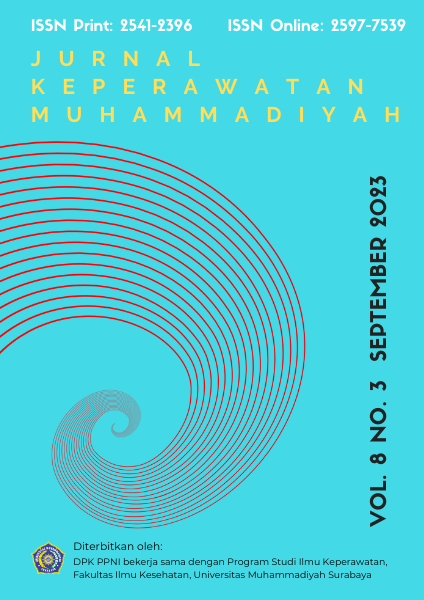Readiness Of Community Health Centers Nurse In Implementing Psychosocial Nursing Care During The COVID-19 Pandemic
DOI:
https://doi.org/10.30651/jkm.v8i3.15308Keywords:
Nursing Care, Psychosocial Problems, nurse, community health centerAbstract
The COVID-19 pandemic has an impact on psychological changes: anxiety, depression, and fear which can cause psychosocial problems in the community. So, nurses are needed as holistic health care providers in carrying out psychosocial nursing care to help the recovery process of patients with psychosocial health problems during the COVID-19 pandemic as to reduce the risk of mental disorders. This study aims to determine the level of readiness of community health centers nurse in carrying out nursing care on psychosocial problems. This research uses quantitative descriptive research with a survey design. Respondents in this study were 105 health center nurses, using a simple random sampling technique. The descriptive data univariat analysis using SPSS Statistics 26 and the Behavioral Health Care Competency Survey instrument. The results showed that 57 respondents had high readiness (54.3%), 40 respondents had moderate readiness (38.1%), and as many as 8 respondents had low readiness (7.6%) in carrying out nursing care for psychosocial problems. Community Health Center nurses are ready to provide nursing care for psychosocial problems, as evidenced by the results of the nurse readiness survey at a high level. It shows that nurses can identify patients' psychosocial problems and provide appropriate interventions to people with psychosocial problems during the COVID-19 pandemic.
References
Agustin, I. M., Nurlaila, N., & Yulia, Y. 2020. Program Penguatan Dan Pendampingan Aspek Psikologis Relawan Bencana Covid 19. Jurnal EMPATI (Edukasi Masyarakat, Pengabdian Dan Bakti), 1(1), 83. https://doi.org/10.26753/empati.v1i1.406
Avery, J. J. (2017). Exploring the Preparedness of Nurses to Care For Medical-Surgical Patients with A Secondary Diagnosis of Mental Illness. East Carolina University.
Brändström, L., Mazaz, N., & Berggren, I. 2015. Nurse collaboration in community and psychiatric care: A Swedish study. British Journal of Community Nursing, 20(6), 297–303. https://doi.org/10.12968/bjcn.2015.20.6.297
Brooks, S. K., Webster, R. K., Smith, L. E., Woodland, L., Wessely, S., Greenberg, N., & Rubin, G. J. 2020. The psychological impact of quarantine and how to reduce it: rapid review of the evidence. The Lancet, 395(10227), 912–920. https://doi.org/10.1016/S0140-6736(20)30460-8
Chen, C. S., Chan, S. W. C., Chan, M. F., Yap, S. F., Wang, W., & Kowitlawakul, Y. 2017. Nurses’ perceptions of psychosocial care and barriers to its provision: A Qualitative Study. Journal of Nursing Research, 25(6), 411–418. https://doi.org/10.1097/JNR.0000000000000185
Couch, S. R., & Coles, C. J. 2011. Community stress, Psychosocial hazards, and EPA decision-making in communities impacted by chronic technological disasters. American Journal of Public Health, 101(SUPPL. 1), 140–148. https://doi.org/10.2105/AJPH.2010.300039
Farokhzadian, J., Miri, S., Doostkami, M., Rezahosseini, Z., & Shahrbaaki, P. 2020. Promoting the psychosocial and communication aspects of nursing care quality using time management skills training. Journal of Education and Health Promotion, 9(1). https://doi.org/10.4103/jehp.jehp_549_20
KEPPRES No 12 2O2O. TentaPenetapan Bencana Nonalam Penyebaran Corona Virus Disease 2019 Sebagai Bencana Nasional, Fundamental of Nursing 18=30 (2020).
Intening, V. R., Anggrita, A. W. W., Matitamole, A., Kusumastuti, D. Y., Delia, Febria, P. A., Kartika, R., & Nugroho, S. T. 2021. Kesiapan Perawat Unit Hemodialisa Dalam Menghadapi Adaptasi Kebiasaan Baru Pandemi Covid-19. Jurnal Penelitian Kesehatan Suara Forikes, 12, 37–42.
Keliat, B. A., Hamid, A. Y. S., Putri, Y. S. E., Daulima, N. H. C., Wardani, Y., Susanti, H., Hargiana, G., & Panjaitan, R. U. 2019. Asuhan Keperawatan Jiwa. EGC.
Kementerian Kesehatan Republik Indonesia. 2022. Pandemi COVID-19 Memperparah Kondisi Kesehatan Jiwa Masyarakat.
Kiernan, G., Meyler, E., & Guerin, S. 2010. Psychosocial issues and care in pediatric oncology: Medical and nursing professionals’ perceptions. Cancer Nursing, 33(5). https://doi.org/10.1097/NCC.0b013e3181d5c476
Kim, J., & Shin, S. 2022. Development of the Nursing Practice Readiness Scale for new graduate nurses: A methodological study. Nurse Education in Practice, 59(February), 103298. https://doi.org/10.1016/j.nepr.2022.103298
LeStari, D. A. L., Priambodo, A. P., & Lumbantobing, V. B. M. 2017. Kesiapan Perawat Gawat Darurat Rumah Sakit Umum Daerah Kabupaten Bandung dalam Menghadapi Bencana. Jurnal Keperawatan ’Aisyiyah, 14(2).
Masyah, B. 2020. Pandemi Covid-19 Terhadap Kesehatan Dan Psikososial. Jurnal Keperawatan, 2(8), 353–362.
Mersin, S., Demiralp, M., & Öksüz, E. 2019. Addressing the psychosocial needs of patients: Challenges for nursing students. Perspectives in Psychiatric Care, 55(2), 269–276. https://doi.org/10.1111/ppc.12365
Nuryani, R., Dolifah, D., Prameswari, A., Astuti, K., Sopiah, P., & Lindasari, S. W. 2022. Optimalisasi Peran Perawat Puskesmas dalam Pelayanan Keperawatan Kesehatan Jiwa pada Masa Pandemi COVID-19 melalui Program Pelatihan Community Mental Health Nursing (CMHN). 5, 1276–1285.
Pinilih, S. S., Astuti, R. T., Kesehatan, F. I., Magelang, U. M., Kesehatan, F. I., Magelang, U. M., Kesehatan, F. I., & Magelang, U. M. 2015. Manajemen Kesehatan Jiwa Berbasis Komunitas melalui Pelayanan Keperawatan Kesehatan Jiwa Komunitas di Wilayah Dinas Kesehatan Kabupaten Magelang. The 2 Nd University Research Coloquium 2015, 2, 585–590.
Undang-Undang No. 38 tentang Keperawatan. 2014. Republik Indonesia
Rutledge, D. N., Wickman, M., Drake, D., Winokur, E., & Loucks, J. 2012. Instrument validation: Hospital nurse perceptions of their Behavioral Health Care Competency. Journal of Advanced Nursing, 68(12), 2756–2765. https://doi.org/10.1111/j.1365-2648.2012.06025.x
Sari, M. K., & Susmiatin, E. A. 2022. Gambaran Diagnosa Keperawatan Jiwa di Wilayah Kerja Puskesmas Kepung. 13, 80–88.
Sherchan, S., Samuel, R., Marahatta, K., Anwar, N., van Ommeren, M. H., & Ofrin, R. 2017. Post-disaster mental health and psychosocial support: Experience from the 2015 Nepal earthquake. WHO South-East Asia Journal of Public Health, 6(1), 22–29. https://doi.org/10.4103/2224-3151.206160
Dinas Kesehatan Kabupaten Sumedang. 2021. Data Covid-19 Kabupaten Sumedang. Sumedang
Utomo, D., Sarsintorini, P., & Sutrisno, E. 2021. Tanggung Jawab Hukum Perawat Praktek Mandiri terhadap Asuhan Keperawatan dalam Upaya Pelayanan Holistik (Studi di Puskesmas Margadana Kota Tegal). BHAMADA, Jurnal Ilmu Dan Teknologi Kesehatan, 12(1), 39–45.
Videbeck, S. L. 2020. Psychiatric-Mental Health Nursing 8th edition. Wolters Kluwer.
Downloads
Published
Issue
Section
License
Copyright (c) 2023 Reni Nuryani, Sri Wulan Lindasari, Popi Sopiah, Hikmat Pramajati, Puspa Madya Nurhuda

This work is licensed under a Creative Commons Attribution-ShareAlike 4.0 International License.
- Penulis tetap memegang hak atas karyanya dan memberikan hak publikasi pertama kepada jurnal ini yang secara simultan karya tersebut dilisensikan di bawah:Â Creative Commons Attribution-ShareAlike 4.0 International (CC BY-SA 4.0)













